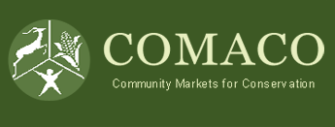Just a few months ago in January 2014, Carrie Young traveled to the Eastern Province of Zambia to conduct one on one surveys in an effort to assess the effectiveness of COMACO’s radio show, Farm Talk. Just days after the trip, she returned late to TA in one of my communication classes, and I immediately wanted to hear about the project. She began by educating me about COMACO (Community Markets for Conservation), a wonderful company in Zambia with goals to reduce poverty and improve quality of life through conservation and farming.
COMACO was founded when Dale Lewis, a biologist working on his dissertation, was doing research in Zambia many years ago and decided to stay to help wildlife conservation in 2003. This non-profit company uses a holistic model to attack dimensions of wildlife, environment, and human health. Its main goals are sustainable food security, wildlife conservation, and ecosystem preservation. The organization targets smallholder farmers and uses extension workers to teach better farming and land use methods that promote the above goals. They also reward farmers who use conservation methods with trade benefits and with a market to sell their produce to. COMACO creates local depots in the farming local areas that provide this market to farmers who, through conservation techniques, are able to produce surplus grains.
One of COMACO’s many efforts is their radio program, Farm Talk. This program conveys important information for improvement of food security, environmental sustainability, and human health, and reaches over 100,000 farmers. Not only does it give information that farmers can directly use, but it also makes them aware of the resources that COMACO has to offer and how they can get involved. It airs twice weekly in the Eastern Province of Zambia in their most commonly used language, Nyanja. In September 2013, ACSF’s Rapid Response Fund enabled Professor Katherine McComas and Ph.D. Student Carrie Young with the funds to evaluate this program and survey the response of farmers and how they are learning and using information from Farm Talk.
In order to make this evaluation, Carrie Young and the producer of the radio show, Filius Jere, conducted interviews with 34 individual farmers to collect initial information. The interview was split up into sections including demographics, exposure to Farm Talk and COMACO, perceptions/comprehension/recall, beliefs/attitudes, and adoption/diffusion of information.
They found that most farmers very consistently gathered in groups from 5 to 30 or more people to listen to the radio program. Lead farmers who had been trained by COMACO extension workers usually organized the gatherings and allowed for discussion after the program. Farmers reported that the information given in each radio show is a good amount and presented in a way that they can follow it and apply it. Many said that if they had questions or needed follow-up help they referred to their lead farmer or COMACO’s The Better Life Book. Farmers did show an interest in more interactive features with the show, like having question and answer call-ins. This, along with their supplemental use of contact with other farmers, shows the benefit of personal contact for farmers to be able to process and use the information in their own farming methods. Although Farm Talk and The Better Life Book are significantly useful resources, no one resource can ‘do it all.’ COMACO is smart to have many resources that overlap in order to reinforce learning and give multiple ways of learning and implementing information.
The importance of reinforcement was also confirmed throughout the surveys when farmers were asked if they had learned new information. Most actually said that they had not learned new information on the show, but used it as a way to reaffirm what they had already learned about conservation farming, beekeeping, and raising poultry. This reinforcement is important to these farmers, however, or they would not continue to listen to the show with such dedication. These farmers who listen to Farm Talk understand the benefits of trying new things. They also want to hear about others like themselves who are trying these things. The desire to hear directly about other farmers’ questions, successes, or failures on the show was expressed more than once. Farmers who are trying these new methods want to hear firsthand from others what works and what doesn’t, and how they can make improvements on their own farm.
COMACO is still young, but is making huge advancements for sustainable food security and ecosystem preservation in Zambia, Africa. Farm Talk is one effective tool that they are using to convey information and methods to smallholder farmers. The show is not only reinforcing information learned by individuals; it is also changing the social norms and increasing the acceptance and use of conservation farming and practices. Farmers are willing to try new things, defying the culture of skepticism. COMACO is providing multiple layers of resources and sources of information that is helping African farmers to make gains and improve their quality of life. The obvious improvements that COMACO have made in Zambia are proof to me that a sustainable future really comes through small steps.



